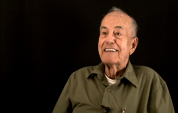7:14 | "We trained 14 months to fight 82 days," says David Potter, who tended the engines on a landing craft that delivered troops to the Okinawa invasion. He was relieved that their anti-submarine strategy, which called for the unescorted craft to ram the attacker, never had to be implemented. There were daily air attacks, as well as Kamikaze boats, a strange new menace.

There was no set end date for the Navy recruits to graduate from basic training, so it seemed to David Potter that "they graduated a class anytime they sank a ship." From there, he went to Engineering and Diesel schools and prepared to serve on an LCI, Landing Craft Infantry.
The brand new landing craft was small enough to travel from the shipyard on Lake Huron, through the Chicago Canal to the Illinois and Mississippi Rivers, and down to the Gulf of Mexico. After making their way to the west coast, David Potter and the rest of the crew repeatedly invaded California beaches in preparation for joining the war in the Pacific.
David Potter tells how his ship, a landing craft, participated in the battle of Okinawa, first landing troops on the beach and then conducting search and rescue and laying smoke screens. Then, his ship was assigned an unusual task which disturbed him so much that he couldn't speak of it for fifty years.
Before David Potter headed home from the Pacific, he saw for himself the devastation of Japanese cities, and the gracious nature of the defeated Japanese people. Finding no good job prospects after the war, he re-enlisted and served out his career on a variety of ships.